Previously on Drokk!: The last time we did an episode, we looked back at the past of the series with the fourth and final (to date) volume of the Restricted Files collections of ancillary Dredd stories, and it really, really wasn’t good. Both of us hoped things would pick up for this, the final episode of Complete Case Files reading, and… spoilers… it really, really did.
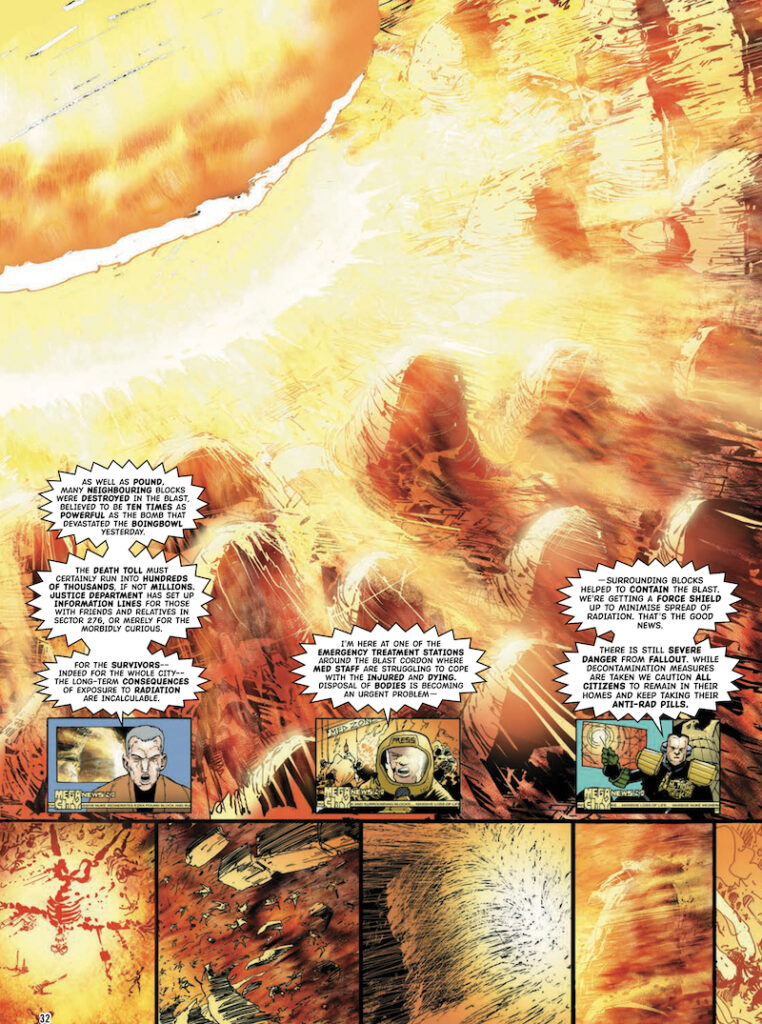
0:00:00-0:06:03: We introduce ourselves, and the fact that we’re talking about Judge Dredd: The Complete Case Files Vol. 40, a book published in the US within the last month, judging by the number of times we saw it on New Release shelves at the end of last month. We also quickly talk about how much we love the book, which is easily the strongest this series has been in a long time — and that’s not meant to suggest that it’s been bad up until now; this is just a really great volume.
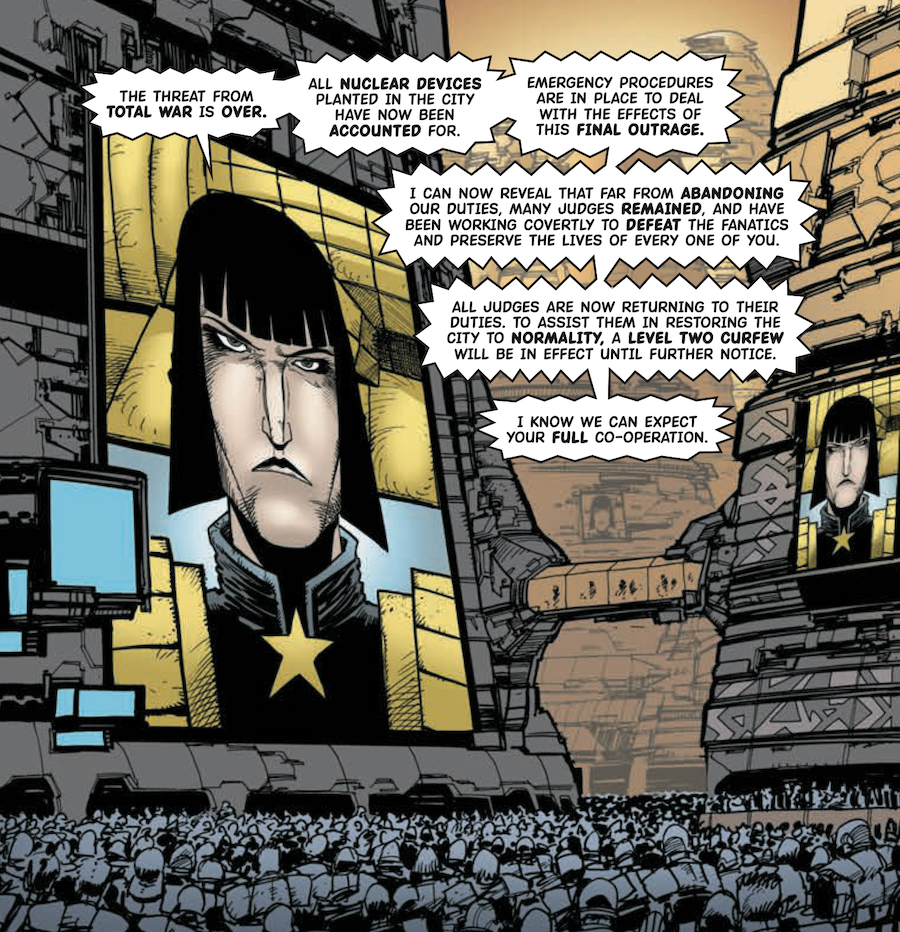
0:06:04-0:10:05: In what is a brief prelude to what’s about to come — but, in its inability to complete the thought that we think we’re staying so strongly on topic for — we talk about one of our reasons for loving the volume so much: that the book, at least in its 2000 AD chapters, feels like one coherent story, starting from an event that massively re-energizes the strip. And that event is…

0:10:06-0:54:20: …the storyline “Total War,” which is a mega-epic unlike anything we’ve seen in Dredd before, in large part because it treats the apocalyptic events as something truly traumatizing and not easily recovered from. Is this because it’s the first widescale “Mega-City One gets fucked” story created since 9/11, we wonder, and think about what 9/11’s aftermath felt like when this story was published in 2004. We also talk about the ways in which this storyline feels like a practice run for “Day of Chaos,” a storyline that would be published some years later — laying some foreshadowing of our own — as well as John Wagner being a “both sides” writer, and the wonder that is Henry Flint, whose work in this arc is genuinely staggering. (We spend more time than usual talking about a particular sequence, and what Flint and colorist Chris Blythe achieve here, but it’s entirely deserved.) At some point, one of us describes this arc as a masterclass in comics, and I’m standing by that as I type these words.
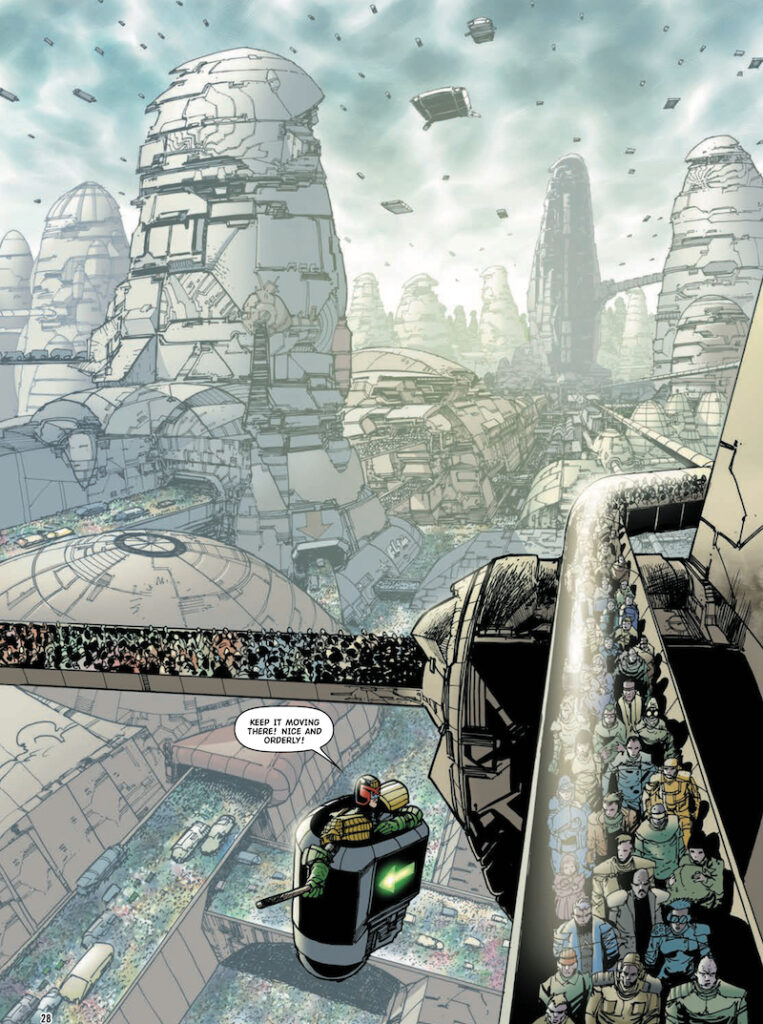
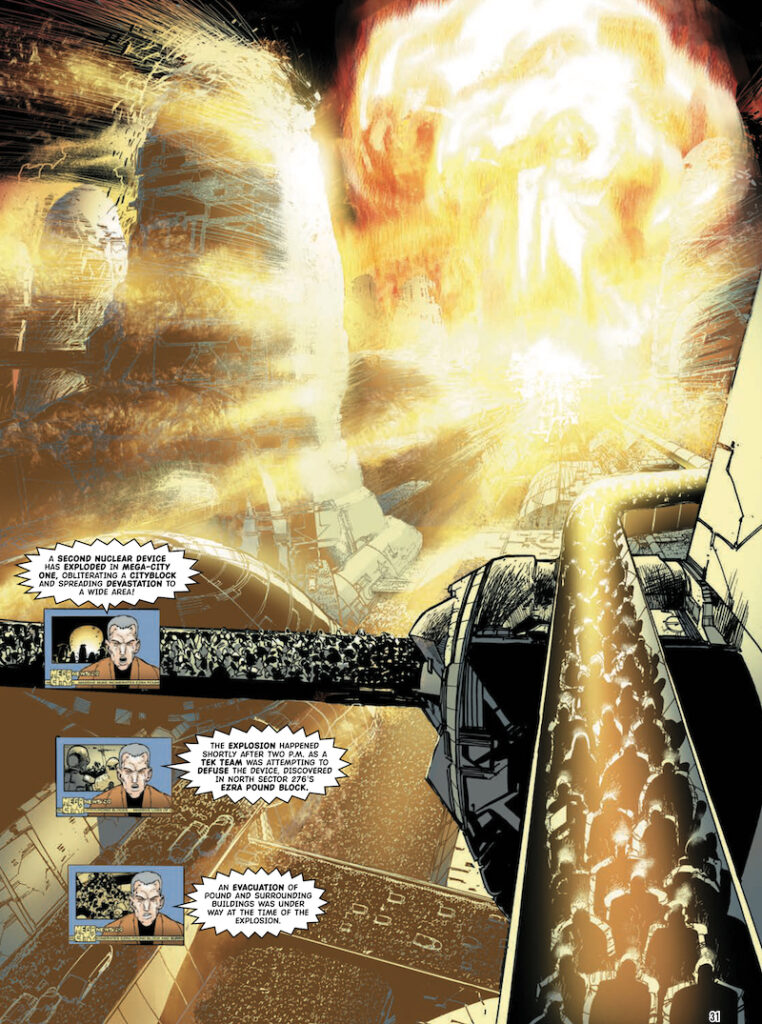
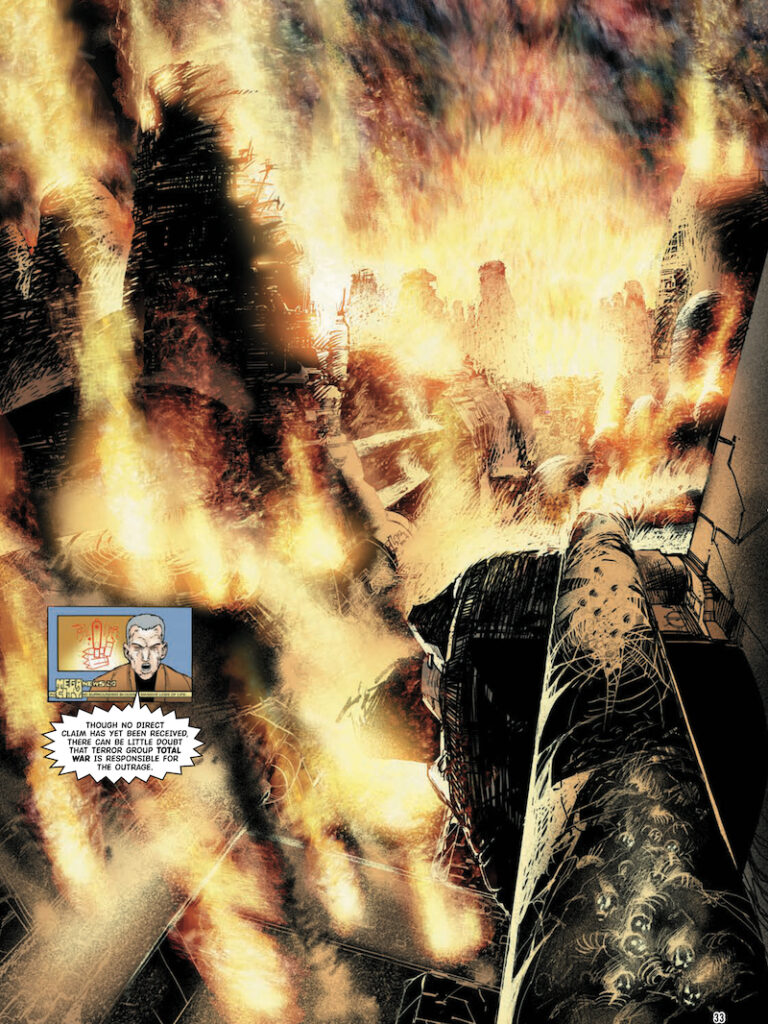
0:54:21-1:17:48: We’re not done with “Total War” yet, because we dig into the B-plot, which worked for me more than it worked for Jeff, who was arguably objectively right on this particular topic. I also love the very last page of the story, which leads Jeff into one final(?) classic “Jeff is perhaps reading too much into what’s on the page” moment of the run, but at the same time, I suspect that he’s spot on when it comes to some of the subtext, so… that’s a win…?
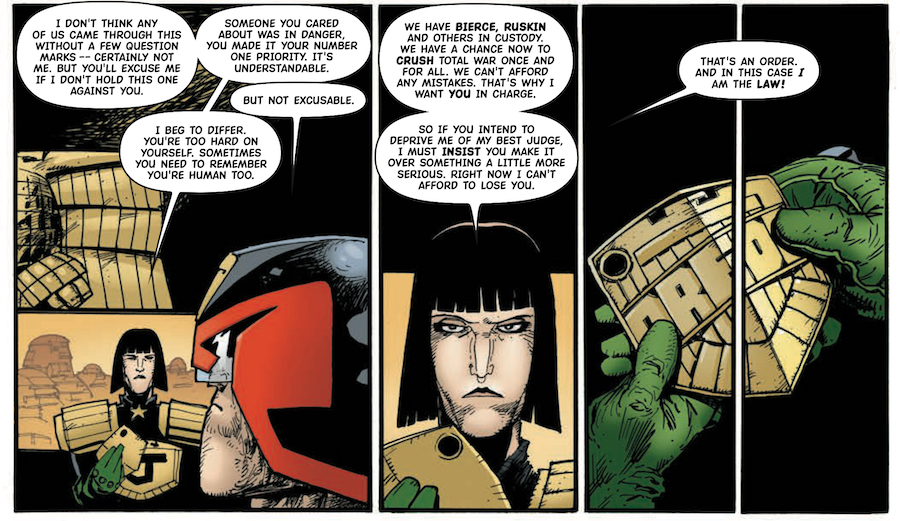
1:17:49-1:35:40: Having spent more than an hour on ~70 pages of a 200+ page book, we start speeding through the rest of it, in an attempt to keep the episode to a reasonable length. As a result, we rush through the following topics when discussing the remainder of the 2000 AD episodes in the book: Is Jason Brashill’s art too cartoonish for the subject matter of a grim John Wagner arc? Why is Gordon Rennie returning to the pairing of Vienna and Rico? How fucking great is D’Israeli? (Very; he’s very fucking great.) Is Ian Gibson too cartoonish for the subject matter of a downbeat Gordon Rennie arc? Also, why do neither of us really care or even remember that much about Judge Karyn, who’s obviously meant to be a major player in the arc she appears in? (Also also: Boo Cook’s colors are amazing.) It’s pretty all over the place for 18 minutes, really.
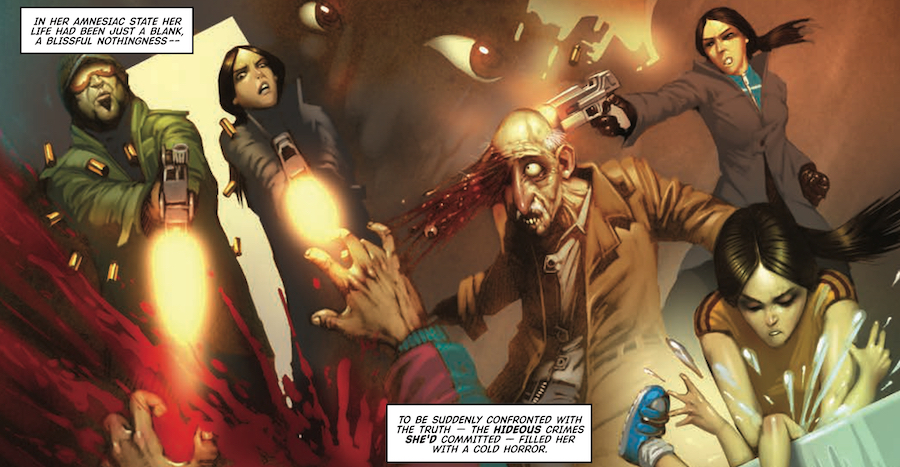
1:35:41-1:52:33: And yet, somehow, it sounds coherent and considered next to our rush through the Megazine episodes of the book, which include a John Smith-written Devlin Waugh cameo — which nonetheless has nice art from John Burns — as well as the strongest Alan Grant story we’ve seen in this series in recent memory, a Gordon Rennie one-off with Simon Coleby called “Meat Patrol” that is up there with Wagner’s work, and Jeff’s favorite thing in the world: John Wagner writing sportscasters. (That said, the story in which those sportscasters appear also got him thinking about Chloe’s piece about underground comix from The Gutter Review, so there’s more here than just Jeff loving the banter.)
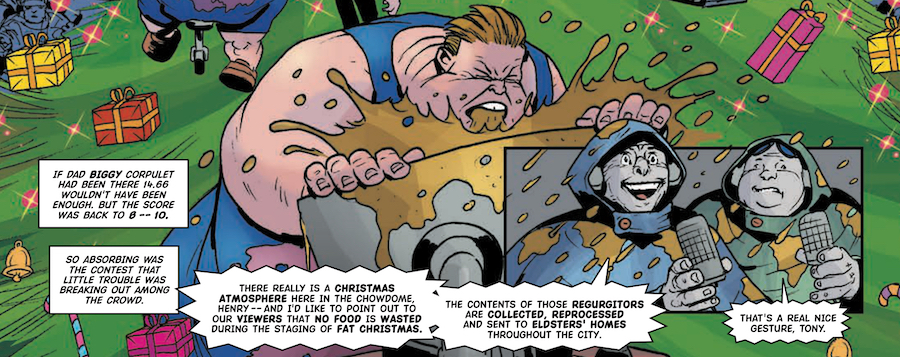
1:52:34-1:57:41: Oddly enough, we’ve spoiled our traditional format by announcing that this volume was Drokk and not Dross all the way at the start of the episode, and it’s also pretty clear what our favorite stories in the volume are, as well, so clearly we should once again return to our shared love of Henry Flint by talking about his placement in the Dredd artist pantheon. (I suspect this is going to get some people thinking we were too generous, but you know what? We really weren’t.)

1:57:42-2:01:02: We’re caught up with the Complete Case Files, so what are we going to do for our (shiver) final Drokk!? How about the afore-mentioned Day of Chaos, which fucks MC1 up to a degree previously unseen in Dredd, and lets Wagner go for the slow, horrific dread (no pun intended) for almost a year’s worth of stories. I tease what to expect here.
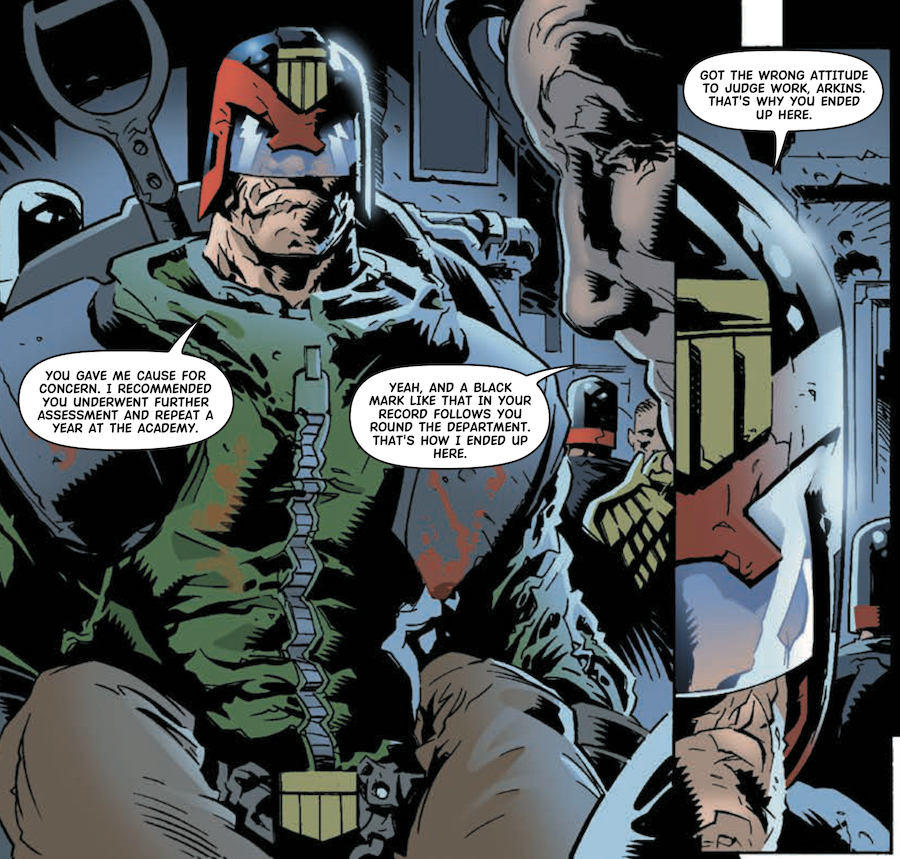
2:01:03-end: And then, it’s almost all over, bar the regular wrapping up of Twitter linkage and Jeff telling everyone about Patreon — oh, and us going over the fact that we’re ending the podcast at the end of the year, as well. Go leave us messages and questions for next week’s Wait, What? Q&A episode either via email (waitwhatpodcast at gmail etc.) or @WaitWhatPodcast on Twitter before it implodes, and come back next week for the near-end of Mega-City One, and the definite end of Drokk! As always, thanks for listening and reading along.


For those looking for the direct feed: http://theworkingdraft.com/media/Drokk/DrokkEp45.mp3
As much as it’s a joy to hear you wrapping up Drokk! on such a high I have to quibble with you over just how good this volume was. I read many of its stories during the last time I was purchasing 2000ad regularly so read Total War on a week by week basis and therefore I think it had a different effect on me than it being read in one sitting without the other, non-Dredd stories around it. My biggest memory, and this may have been a contributor to my finishing reading 2000ad sometime in the couple of years after this (I recall reading Day of Chaos) was “Oh no, not again.” For all that you correctly point Total War was a reaction to 911, it also felt like yet another story showcasing the brutality of the future following the genocides of the Apocalypse War, Necropolis and Day of Judgement and it left me questioning why I should invest in any character in the Judge Dredd universe when they were felt to be so disposable.
Having said that, the return of Vienna Dredd, previously my favourite supporting character despite only having been in one issue (Prog 116, and her co-creator is Ian Gibson, fact fans!) gave me hope. Her story since her first appearance is very much a revisitation of that story, where Vienna is revealed to be possibly the only person Dredd feels genuine affection for and therefore deliberately distances himself from her (to the point of removing himself from her life completely no matter what he believes to be the short term pain). I think this is the reason Williams keeps revisiting her with the Dread alternates, to show just how different he is on the surface to them, while also showing that underneath there is in fact little to no difference. Which is the point of Nimrod in Total War, and by concentrating on Vienna and him it humanises the devastation depicted on the devastation around them. Pulling back to 911 and my memories of the horror of watching it on the day, the greatest upsetting image wasn’t the collapsing building but the lone figure photographed falling.
It’s also a story I wonder about whether it would have existed in the same form if developed a year later, after the UK had the terrorist attack of July 7th, 2005.
I’m genuinely surprised that you were so easy on Decent, which for me is an incredibly nasty little story and is all but a fridging of Judge Karyn. The story is essentially a retelling of the first Judge Death appearance: mystical threat defeated by the self sacrifice of a female telepath, in part to save Judge Dredd. But whereas Anderson in that appearance became a fan favourite, was realistically (albeit glossily) drawn, and had a fate of a human Barbie doll forever wrapped in plastic and put on display to all as an example of the heroic cost of protecting the citizens of Mega City 1, Karyn is a cartoonishly drawn woman and then has even that appearance taken away form her, turned into a mindless monster and is forever locked away in a dark basement where none can lay eyes on her ever again.
Horrible.
A greater example of why 2000ad needs more female creators I cannot think of, and the other contributing factor to my leaving 2000ad for good a few years later.
But to end the last regular Drokk! on a high note, my fondest memory of 2000ad and Judge Dredd is meeting the artist Ron Smith in a corridor at the 1990 UKComics Area Convention and both of us saying how much we missed Walter the Wobot…
Carey—lots of excellent points here. I just wanted to jump in and say that I also clocked the echoes of the first Judge Death story, which is essentially why I held off on complaining about fridging. Depending on how cynical you are, Rennie is echoing that story to either avoid incurring criticism of fridging a recurring female character, or—as I suspect but didn’t say—he was laying the groundwork for Karyn to follow Anderson’s arc and come back strongerat some point.
Of course, I haven’t read much ahead of the Case Files so you may well know that, for example, she never did which would then make this extremely egregious. But for me, I kinda assumed Rennie (and the 2000AD editorship) were trying to develop another strong female psi-division judge since Anderson (and I’m probably wrong about this) seems off-limits to anyone other than Wagner and Grant to use.
I could on at painful length about your other points (albeit not with as much disagreement) but will leave at thanking you for your memory of meeting Ron Smith. I love the idea that both you and he were WtW fans!
Chiming in to agree with Carey that I think our hosts overstated the quality of this volume in general, and Total War in particular. That’s not to say it was bad — for me it’s yet another volume to which Jared’s excellent phrase, the “golden rut” applies. Especially the art — our hosts were entirely right, for me, about how fabulous the art is here.
But the writing? It’s good, but not exceptional. Total War in particular: this is essentially a very standard thriller about bombs having been planted in different locations, and chasing around and finding them. It supersizes that plot, with nuclear bombs in a massive sprawling Mega-City, but it’s that plot, and it does what you expect from that plot. One specific thing that it’s lacking, for me, is effective little touches of scabrous Wagner satirical humour, like the way in which he cut away from the Democracy stories to the couch-potato family — it’s far too reverent of itself.
And what about the whole “Ah, but this time we follow up on that, this time we explore the ramifications.” I don’t think this is is as new or radical as our hosts suggested. What about The Pit? Which, one might respond, didn’t change the whole of Mega-City One? Yes, but we’re not reading Mega-City One, we’re reading Judge Dredd. The Pit was a more radical change to what Dredd stories are usually like, and sustained it for an awful long time before shutting it down.
And if we judge this as “How does it change Mega-City One?” it’s pretty weak stuff, isn’t it? It’s basically continuity references — while the writers do a good job of blending the aftermath in with their stories, I don’t think any of those stories *required* this for their fundamental conceits. (We see people set off into the Cursed Earth all the time in Judge Dredd, etc.).
There’s not much that counts as writing *about* the aftermath, how it changes people. For instance, we don’t see any exploration of how horrific terrorist acts on this scale might affect the whole questions of how the issues of democracy and authoritarianism play out in the minds of the citizens. In a 9/11 riff being written this long *after* 9/11, at a time when the Iraq War was underway, this absence of interest in what people do next makes this volume seem superficial, for all the brilliant art. Maybe it’s in the the next volume, but it’s not in this one.
This is not to say that there’s not good stuff here on a character level: I really liked the moment where Dredd tries to resign because he didn’t live up to his own insane values. And it’s not to say that this is overall bad. But it’s not amazingly better than Dredd is at this point.
Gotta disagree with Voord and the others here (Though thanks for the continued use praise for introducing the Golden Rut) about Total War. As Graeme and Jeff both point out, this is absolutely a post 9/11 take on terrorists, and it’s important to compare this to how everyone else in pop culture was dealing with terrorism. In 2004, 24 was on it’s fourth season of Kiefer Sutherland torturing Arabs. I believe this aired the same year 24 had a whole plot of an Arab terrorist sleeper cell mom ordering her son to murder his blonde, white, American girlfriend, which he does because they’re terrorists. Battlestar Galactica premiered at the same time, and while it tried to complicate the setup further into the show, still treated terrorists as some genocidal, unknowable Other, that could flip a switch from friend to murder crazed animal in an instant, because they’re Terrorists. To say nothing of Toby Keith’s Boot in your Ass song, or the Bush admin’s scare tactics around terrorism leading into the invasion of Iraq, panic runs on duct tape and more. I was in college at the time, and someone called in an Anthrax scare to get out of a test. The CDC flew in a helicopter to search the building. Terrorists were all present boogeymen who were Coming to Kill Us, and they Wouldn’t Listen to Reason because Terrorists are Fanatics.
So to have Wagner writing a story where the terrorists are shown to be a complex organizations made up of infighting and arguments about tactics, with concrete political goals, and to have rank and file members turn on the actions of their own organization was absolutely Wagner swimming against the tide of the time. Yes, it’s another Dredd breaks up a gang/cartel story, like we’ve seen hundreds of times, but the details matter, like they always do with Wagner. The scale of the carnage is important, but so is Dredd promising the Total War member who turns himself in he will be protected then IMMEDIATELY turning him over to be tortured for information.
It should also be noted this was being published a year after the Abu Gharib prison torture was being reported. Amnesty International published the first report in June 2003, and April 2004 was when 60 Minutes and Seymour Hersh published their reports on the prison, which I believe is the first time the photos of what happened in the prison were widely seen by the public. So Wagner has his finger on the pulse to an absurd degree, and if his work looks lesser in hindsight I would argue it’s because of how fucking insane everyone was at the time.
Past that, let me congratulate you both on 40 Case Files plus more. I’m sorry to see it end, though god knows you’ve both earned some rest. I’m glad you’re going out on Day of Chaos, though I am a little sad that you’re having to skip Origins and Tour of Duty, as they’re great in their own right, and in my mind form a fantastic tryptic with Day of Chaos. Origins is just that, how the Judges seized power and how it was always built on a lie, while Tour of Duty is how the Judges administer the system, how they are terrible at it, and how reform within the system is impossible, and without getting into too many details until next episode, Day of Chaos is when it all comes tumbling down. All three together are probably Wagner’s greatest long game run on the title, easily surpassing the lead up to Necropolis, including the Dead Man bait and switch.
Origins is also, I believe, the last mega epic Ezquerra drew in its entirety, which is worth noting. He’s also in a bunch of Tour of Duty, though I don’t believe he shows up for Day of Chaos.
Will Day of Chaos include the Fallout collection? That’s basically Episode 0 for all the current Dredd writers, where they start the plot threads they’ve been following ever since.
Otherwise, thanks to you both for so many years of sharing us in your conversations, the jokes and the insights. Between here and the ongoing collapse of Twitter, I keep flashing back to the end of high school. In that spirit, I hope you both have a bitchin’ summer.
Graeme’s reference to Colin Wilson prompts me to air a new speculation I have about his art. I picked up reprints of Ian Kennedy’s Commando work at the exhibition of his work in Harrogate, part of the Thought Bubble festival. The stark use of black in a particularly design way brought Wilson’s early black and white work to mind. There’s the heavy debt to Jean Giraud in that, but the use of black did not come from there.
That leads into Henry Flint. He’s really good, I enjoy his work, but he seems an unusual case. He’ll probably influence up and coming artists, but we’ll only know if they tell us. Otherwise it will appear they are following McMahon and O’Neill. I can’t think of someone else who has become so good at storytelling and produces so much, yet is so devoted to producing a surface that evokes his heroes.
A tiny detail I enjoyed in Total War was the cadence of the newsreader’s speech. I could really ‘hear’ it. A master at work.